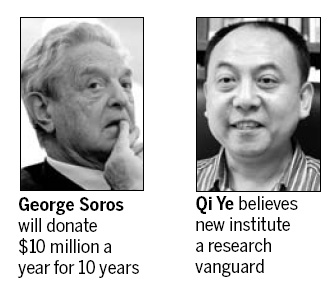Asia-Pacific
Soros puts money where the environment is
By Fu Jing and Li Jing (China Daily)
Updated: 2010-05-13 08:24
 |
Large Medium Small |
Beijing - Businessman and philanthropist George Soros has started assisting China's low-carbon and climate change research by supporting a policy centre at renowned Tsinghua University.

Opened with a low-key ceremony at Tsinghua University last week, the Climate Policy Institute is the third such centre supported by Soros, who has committed to donating $10 million every year for the next 10 years for climate-change policy research.
The CPI set up branches in Berlin in November and Venice in April. Additional centers are planned for New Delhi and Rio de Janeiro this year.
Thomas Heller, who leads the initiative, said in a previous interview that the organization will be part advisory service, part policy developer and part watchdog.
"The CPI will study climate policies in order to help governments and international organizations improve them," said Heller, the founding director of the CPI. "We must identify flaws in the implementation of such policies early on if we hope to achieve climate protection goals."
Qi told China Daily in an exclusive interview on Wednesday that "with the inception of the centre in China, Tsinghua has been equipped as a global low-carbon and climate change research vanguard, either for scientific or policy points of view."
Based on its world-class capacities in energy, fuel, auto and environmental engineering research, Tsinghua University already set up an academy for low-carbon technology research last year, which entered into an alliance with Cambridge in the UK and MIT in the US.
Qi said high-level officials and experts have been on the advisor list of his institute.
"Soros has promised to offer substantial grants to support the research," said Qi. But he didn't specify the scale of the grants, which will be primarily devoted to evaluating the efficiency of local, national and global climate policies.
Apart from publishing an annual report comprehensively examining China's low-carbon roadmap, Qi said his centre will help assess and share energy-saving and low-carbon solutions with the rest of the world.
"As uncertainties are mounting for UN negotiations toward a globally binding climate change pact, global expectations have been lowered," said Qi. "However, we have seen growing enthusiasm worldwide in finding regional or local solutions to coping with global warming and increasing energy efficiency."
New trends in altering the climate change landscape and governance, said Qi, "have proven my belief that global issues should match local practices."










